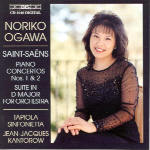It’s always good to see Saint-Saëns’ delightful concertos getting some attention from young pianists, particularly after years of comparative neglect. Noriko Ogawa’s performance of the precocious First Concerto ranks with the best. She’s fluent, lively, and isn’t afraid to attack the music (the finale particularly) like the virtuoso vehicle it is. The Second Concerto goes less well, though there’s nothing seriously wrong with it. Despite plenty of flashy finger work, Ogawa has a tendency to slow down in solo passages, most damagingly in the second movement (check her out about two minutes in, just before the return of the opening theme), where she and conductor Jean-Jacques Kantorow manage to create some awkward joins in music that is all continuity and flow. It’s a small mannerism, but one that detracts from the overall positive impression. Once again, though, her finale impresses with its combination of fleetness and strength. The neo-classical Suite in D Op. 49 makes a substantial and welcome bonus, very well played and recorded. Enjoyable then, and the BIS recording sounds terrific.
































